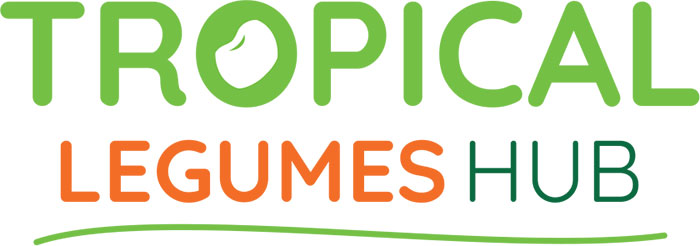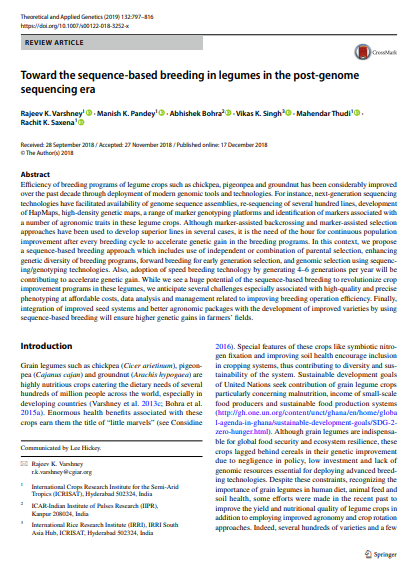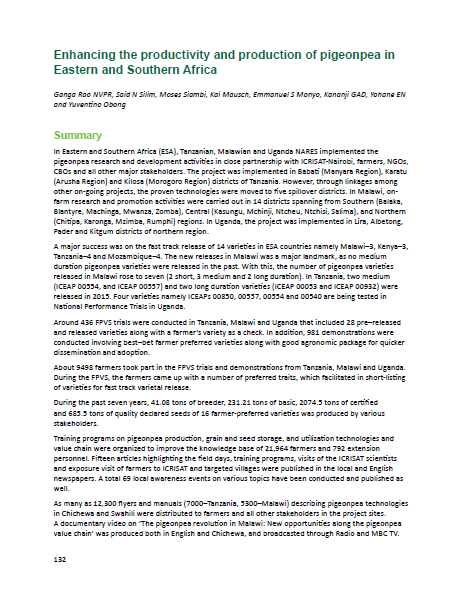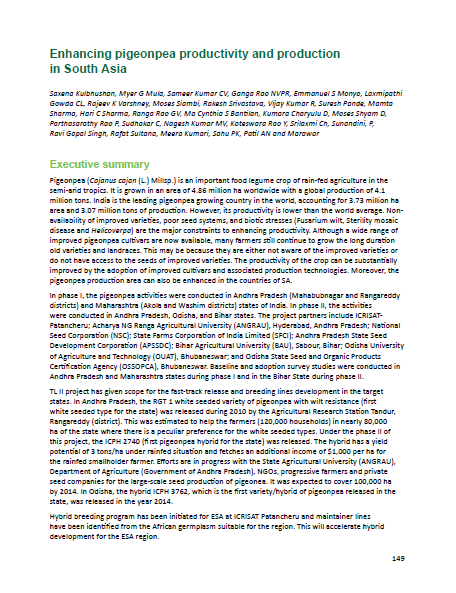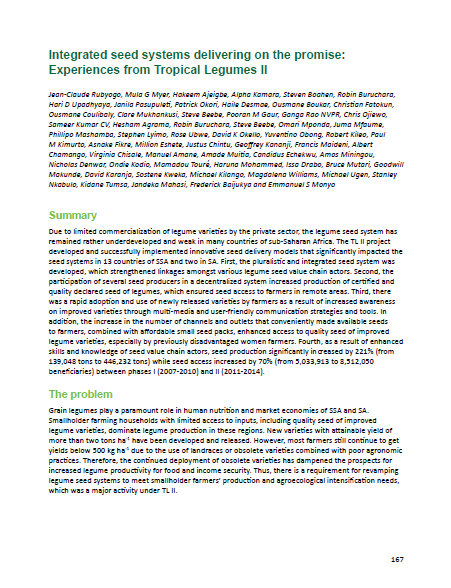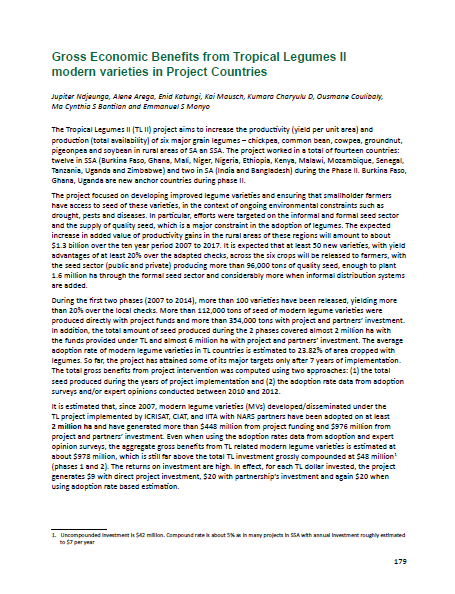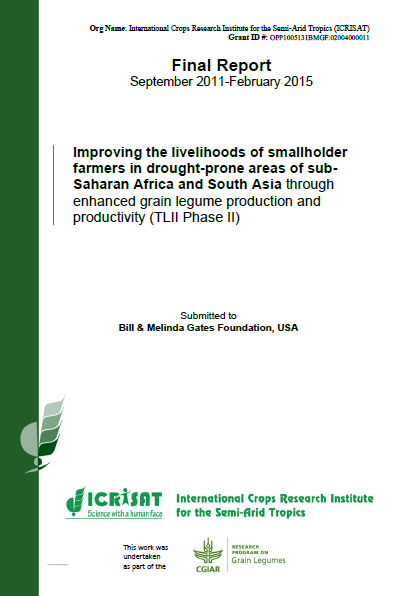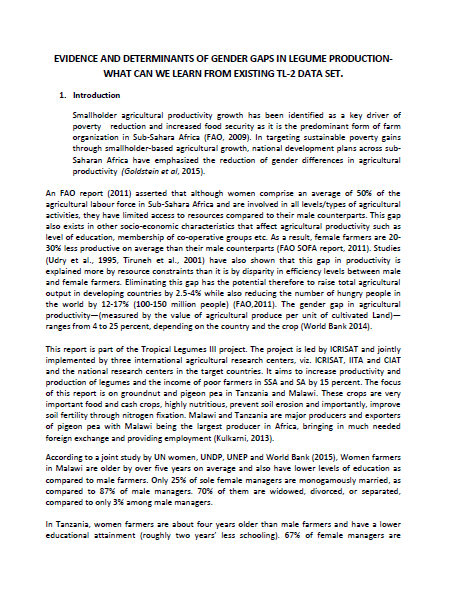Pigeonpea improvement: An amalgam of breeding and genomic research
This paper emphasizes the ongoing genetic improvement in pigeonpea with an amalgam of conventional breeding as well as genomic research.
Project: TLIII
File type: PDF (436.04 KB)
Toward the sequence-based breeding in legumes in the post-genome sequencing era
This this article, the authors propose a sequence-based breeding approach which includes use of independent or combination of parental selection, enhancing genetic diversity of breeding programs, forward breeding for early generation selection, and genomic selection using sequencing/genotyping technologies.
Project: TLIII
File type: PDF (2.23 MB)
Mainstreaming Efficient Legume Seed Systems in Eastern Africa: Challenges, Opportunities and Contributions towards Improved Livelihoods
Technical paper proposing and describing 12 basic principles necessary to mainstream legume seed systems in crop development programs for sustainable agricultural intensification in Eastern Africa.
Project: TLII
File type: PDF (4.69 MB)
Breeding tropical legume crops for resilient cropping systems in Sub-Saharan Africa
This poster abstract summarizes the achievements of CGIAR centers and national research partners, who have with the support of the Tropical Legumes project enhanced legume crop production in Sub-Saharan Africa through the use of genetic technology.
Project: TLIII
File type: PDF (106.17 KB)
Seven Seasons of Learning and Engaging Smallholder Farmers in the Drought-Prone Areas of Sub-Saharan Africa and South Asia through Tropical Legumes, 2007–2014 (Enhancing the productivity and production of pigeonpea in Eastern and Southern Africa: Chapter 9 of 13)
Chapter 9 of a book published after seven years of TLII, representing an important record of the project’s work and achievements.
Project: TLIII
File type: PDF (603.97 KB)
Seven Seasons of Learning and Engaging Smallholder Farmers in the Drought-Prone Areas of Sub-Saharan Africa and South Asia through Tropical Legumes, 2007–2014 (Enhancing pigeonpea productivity and production in South Asia: Chapter 10 of 13)
Chapter 10 of a book published after seven years of TLII, representing an important record of the project’s work and achievements.
Project: TLIII
File type: PDF (302.72 KB)
Seven Seasons of Learning and Engaging Smallholder Farmers in the Drought-Prone Areas of Sub-Saharan Africa and South Asia through Tropical Legumes, 2007–2014 (Integrated seed systems delivering on the promise – Experiences from Tropical Legumes II: Chapter 12 of 13)
Chapter 12 of a book published after seven years of TLII, representing an important record of the project’s work and achievements.
Project: TLIII
File type: PDF (325.21 KB)
Seven Seasons of Learning and Engaging Smallholder Farmers in the Drought-Prone Areas of Sub-Saharan Africa and South Asia through Tropical Legumes, 2007–2014 (Gross economic benefits from Tropical Legumes II modern varieties in project countries: Chapter 13 of 13)
Chapter 13 of a book published after seven years of TLII, representing an important record of the project’s work and achievements.
Project: TLIII
File type: PDF (649.72 KB)
Tropical Legumes II: Final Report
Final report to the Bill & Melinda Gates Foundation on the achievements of the Tropical Legumes II phase II project, which ran from 2011 to 2015. Note, some financial details have been redacted.
Project: TLII
File type: PDF (743.33 KB)
Evidence and Determinants of Gender Gaps in Legume Production: What Can We Learn from Existing TL-2 Data Set
A report on gender gaps in legume production in Malawi and Tanzania. The report analyzes panel data collected in 2008, 2010, and 2013 in Malawi, and 2008 and 2010 in Tanzania.
Project: TLIII
File type: PDF (820.14 KB)
